Did you know that drinking tea has many health benefits? Not only are tea high in antioxidants, they also help to reduce the risk of certain chronic diseases! Continue reading to see how tea benefits your health and what type of tea is best for you!
Caffeine in Tea
The Caffeine content in coffee and tea are as follows.
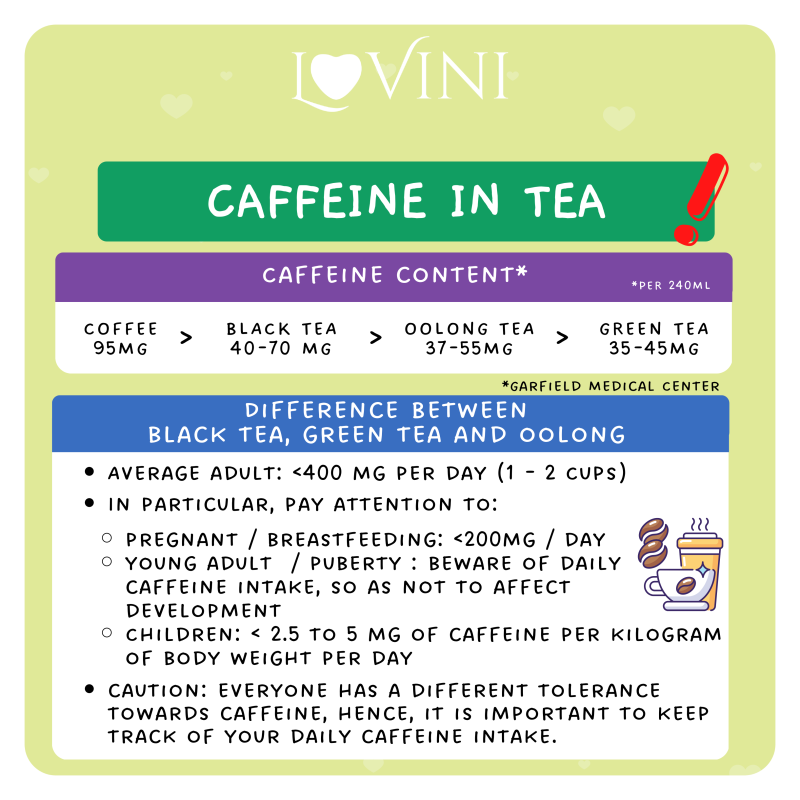
Generally speaking, caffeine intake per day should be as follow:
- Average adult: <400 mg per day (1 – 2 Cups)
- Pregnant / breastfeeding: <200mg / day
- Young adult / puberty : beware of daily caffeine intake, so as not to affect development
- Children: < 2.5 to 5 mg of caffeine per kilogram of body weight per day
Caution: everyone has a different tolerance towards caffeine, hence, it is important to keep track of your daily caffeine intake.
The Nutrition in Tea
There are some natural substances called polyphenols that are found in teas. Polyphenols are antioxidants that studies have shown can reduce the risk of certain chronic diseases.
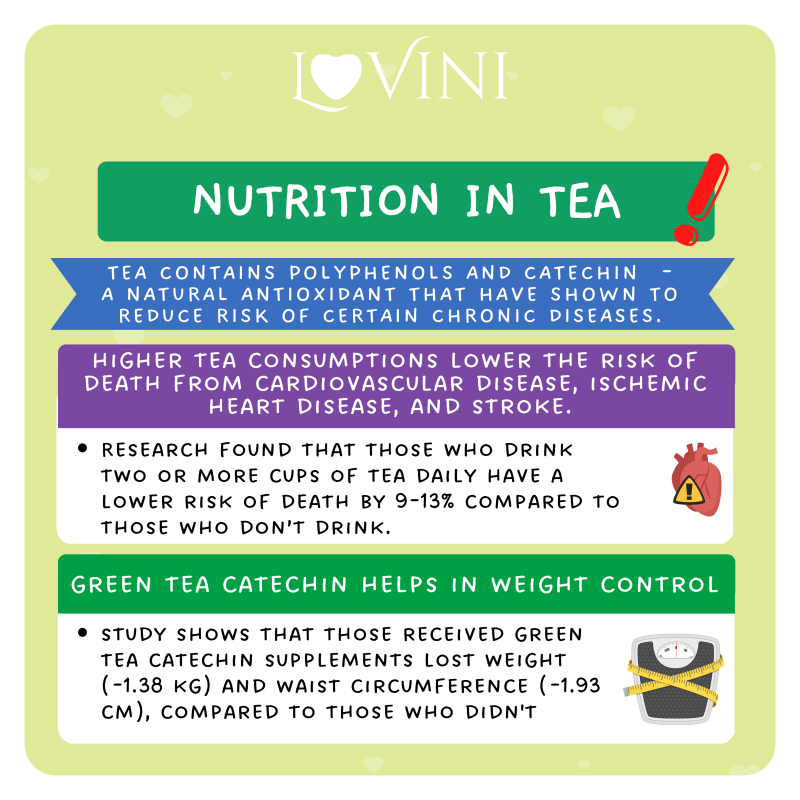
There is a research involving 498,043 men and women between ages 40 and 69. Researchers found that those who are drinking two or more cups of tea daily have a lower risk of death by 9-13% compared to those who don’t drink. Therefore, higher tea consumptions lower the risk of death from cardiovascular disease, ishemic heart disease, and stroke.
Furthermore, according to a study involving 1200 people, while they took the same amount of caffeine, those who received green tea catechin supplements lost weight (average -1.38 kg) and waist circumference (average -1.93 cm), compared to those who did not supplement with green tea catechins. Since losing weight can help reduce the risk of various diseases, including cancer and diabetes, the weight reducing effects of drinking tea can help reduce the risk of cancer and diabetes.
Which Type of Tea is Better?
What’s the difference between the three types of teas? Oolong are made from semi-fermented teas, whereas green tea is not fermented, and black tea is fully fermented. The different health benefits can be found as follow:
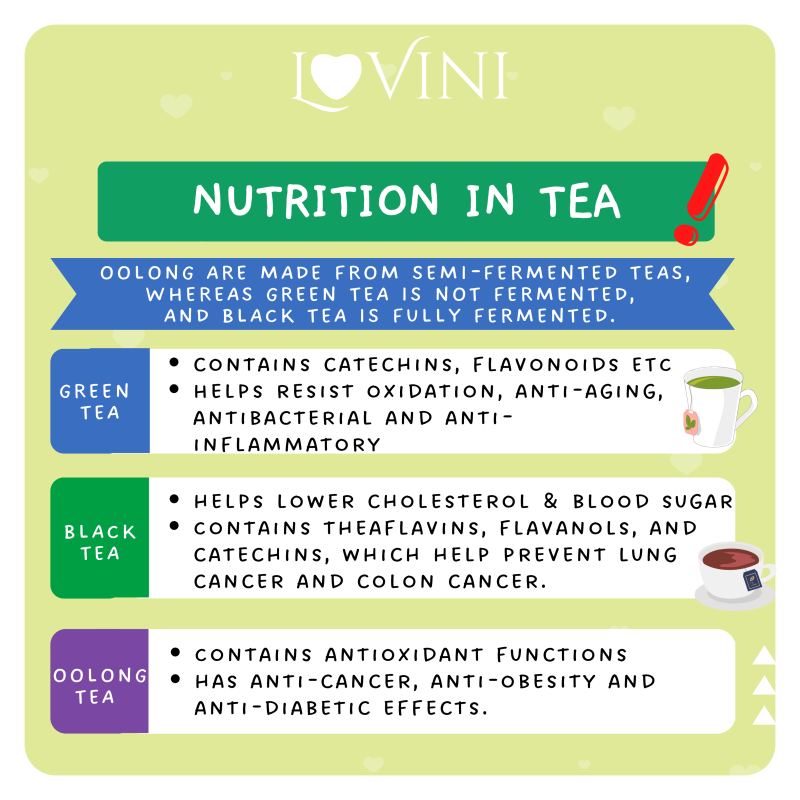
Drinking Advice
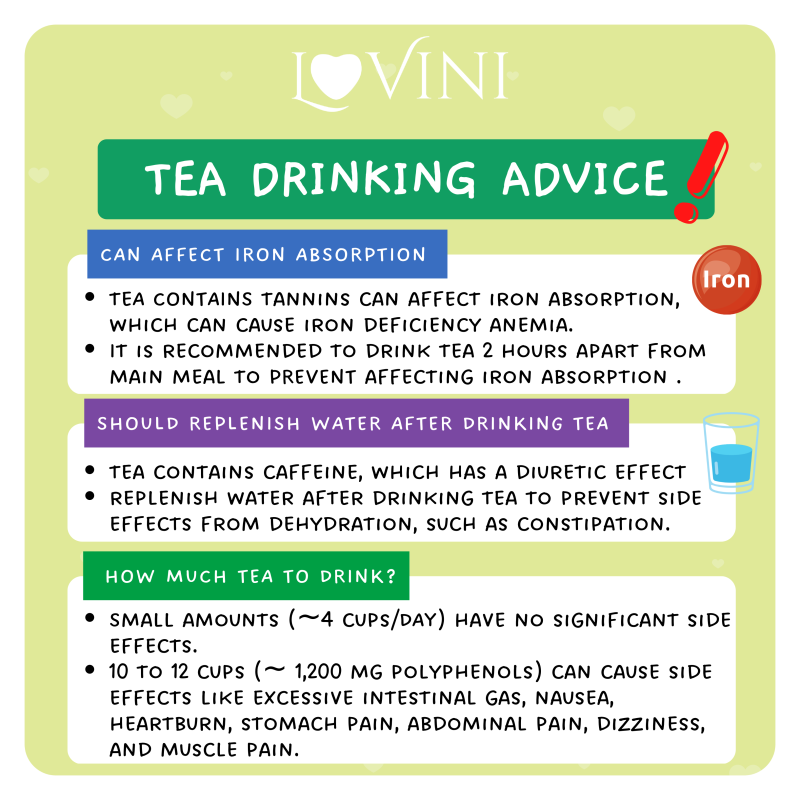
- Drinking tea, coffee, etc. after meals, which contain tannins can affect iron absorption, dizziness, palpitations, and decreased immunity caused by iron deficiency anemia. It is recommended that if you want to drink drinks containing tannins (including tea, coffee, red wine, etc.), you should Try to take it 1 to 2 hours apart from the main meal to avoid tannins from affecting iron absorption .People with anemia should drink tea 2 hours apart from meals and avoid drinking too much tea.
- In addition, most teas contain a certain amount of caffeine, which has a diuretic effect, therefore, we should replenish water after drinking tea to prevent side effects from dehydration, such as constipation.
- Most studies report that small amounts of tea (about 4 cups per day) have no significant side effects. However, drinking 10 to 12 cups of tea (containing 1,200 mg polyphenols) can cause side effects, for example, excessive intestinal gas, nausea, heartburn, stomach pain, abdominal pain, dizziness, and muscle pain.
Reference
- Arthur YAU(2019, April). Coffee: The Morning Routine for Many. Centre of Food Safety. https://www.cfs.gov.hk/tc_chi/multimedia/multimedia_pub/multimedia_pub_fsf_153_01.html#:~:text=%E9%A3%9F%E7%89%A9%E5%AE%89%E5%85%A8%E4%B8%AD%E5%BF%83(%E4%B8%AD%E5%BF%83)%E8%88%87,5%E6%AF%AB%E5%85%8B%E7%9A%84%E5%92%96%E5%95%A1%E5%9B%A0%E3%80%82
- Inoue-Choi M, Ramirez Y, Cornelis MC, et al. Tea Consumption and All-Cause and Cause-Specific Mortality in the UK Biobank: A Prospective Cohort Study. Ann. Intern. Med. August 30, 2022. DOI: 10.7326/M22-0041
- Lambert JD, Kennett MJ, Sang S, Reuhl KR, Ju J, Yang CS. Hepatotoxicity of high oral dose (-)-epigallocatechin-3-gallate in mice. Food Chem Toxicol. 2010;48(1):409-416.
- Hakim IA, Harris RB, Brown S, et al. Effect of increased tea consumption on oxidative DNA damage among smokers: a randomized controlled study. J Nutr. 2003;133(10):3303S-3309S.
- Ferrara L, Montesano D, Senatore A. The distribution of minerals and flavonoids in the tea plant (Camellia sinensis). Farmaco. 2001;56(5-7):397-401.
- Cabrera C, Artacho R, Giménez R. Beneficial effects of green tea — a review. J Am Coll Nutr. 2006;25(2):79-99.
- Phung OJ, Baker WL, Matthews LJ, Lanosa M, Thorne A, Coleman CI. Effect of green tea catechins with or without caffeine on anthropometric measures: a systematic review and meta-analysis. Am J Clin Nutr. 2010;91(1):73-81.

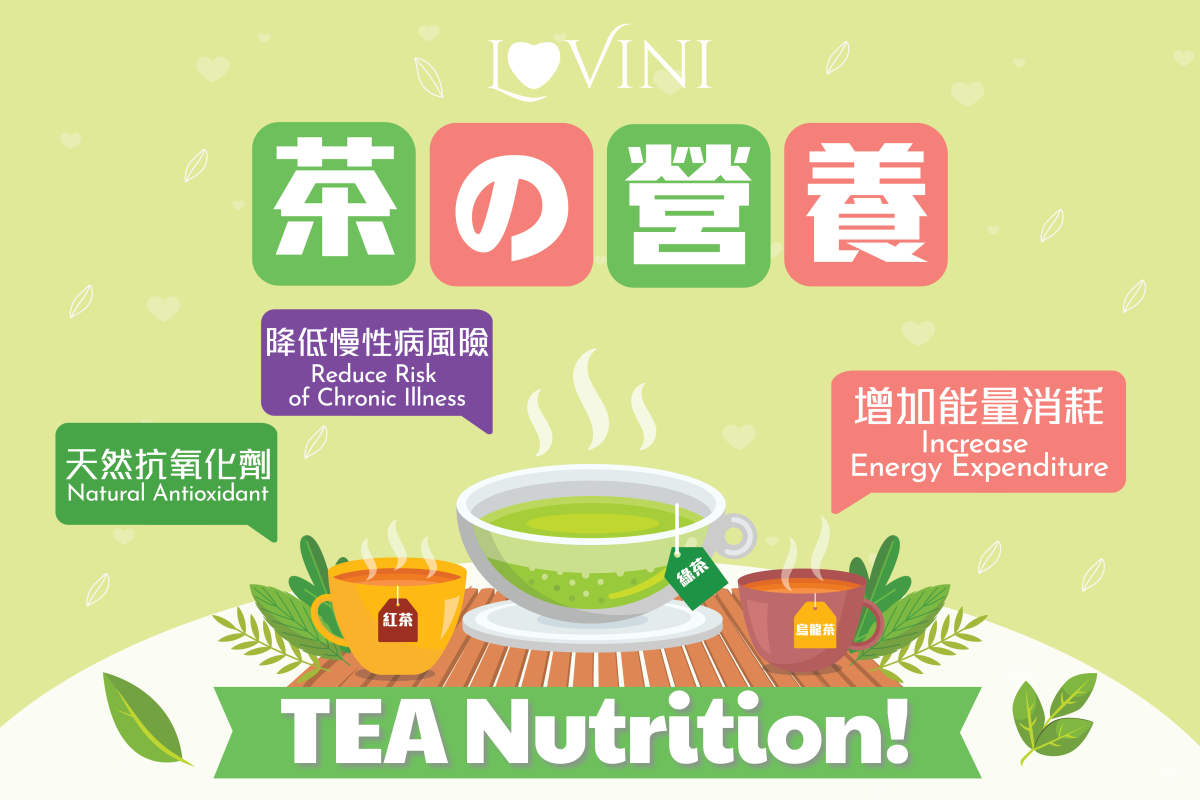
 !
!